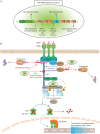A20/Tumor Necrosis Factor α-Induced Protein 3 in Immune Cells Controls Development of Autoinflammation and Autoimmunity: Lessons from Mouse Models
- PMID: 29515565
- PMCID: PMC5826380
- DOI: 10.3389/fimmu.2018.00104
A20/Tumor Necrosis Factor α-Induced Protein 3 in Immune Cells Controls Development of Autoinflammation and Autoimmunity: Lessons from Mouse Models
Abstract
Immune cell activation is a stringently regulated process, as exaggerated innate and adaptive immune responses can lead to autoinflammatory and autoimmune diseases. Perhaps the best-characterized molecular pathway promoting cell activation is the nuclear factor-κB (NF-κB) signaling pathway. Stimulation of this pathway leads to transcription of numerous pro-inflammatory and cell-survival genes. Several mechanisms tightly control NF-κB activity, including the key regulatory zinc finger (de)ubiquitinating enzyme A20/tumor necrosis factor α-induced protein 3 (TNFAIP3). Single nucleotide polymorphisms (SNPs) in the vicinity of the TNFAIP3 gene are associated with a spectrum of chronic systemic inflammatory diseases, indicative of its clinical relevance. Mice harboring targeted cell-specific deletions of the Tnfaip3 gene in innate immune cells such as macrophages spontaneously develop autoinflammatory disease. When immune cells involved in the adaptive immune response, such as dendritic cells or B-cells, are targeted for A20/TNFAIP3 deletion, mice develop spontaneous inflammation that resembles human autoimmune disease. Therefore, more knowledge on A20/TNFAIP3 function in cells of the immune system is beneficial in our understanding of autoinflammation and autoimmunity. Using the aforementioned mouse models, novel A20/TNFAIP3 functions have recently been described including control of necroptosis and inflammasome activity. In this review, we discuss the function of the A20/TNFAIP3 enzyme and its critical role in various innate and adaptive immune cells. Finally, we discuss the latest findings on TNFAIP3 SNPs in human autoinflammatory and autoimmune diseases and address that genotyping of TNFAIP3 SNPs may guide treatment decisions.
Keywords: A20; NF-κB; autoimmune disease; autoinflammation; mouse models; single nucleotide polymorphisms; tumor necrosis factor α-induced protein 3; ubiquitination.
Figures


Similar articles
-
DNGR1-mediated deletion of A20/Tnfaip3 in dendritic cells alters T and B-cell homeostasis and promotes autoimmune liver pathology.J Autoimmun. 2019 Aug;102:167-178. doi: 10.1016/j.jaut.2019.05.007. Epub 2019 Jul 9. J Autoimmun. 2019. PMID: 31151831
-
Single nucleotide polymorphisms at the TNFAIP3/A20 locus and susceptibility/resistance to inflammatory and autoimmune diseases.Adv Exp Med Biol. 2014;809:163-83. doi: 10.1007/978-1-4939-0398-6_10. Adv Exp Med Biol. 2014. PMID: 25302371 Review.
-
B cells lacking the tumor suppressor TNFAIP3/A20 display impaired differentiation and hyperactivation and cause inflammation and autoimmunity in aged mice.Blood. 2011 Feb 17;117(7):2227-36. doi: 10.1182/blood-2010-09-306019. Epub 2010 Nov 18. Blood. 2011. PMID: 21088135
-
Expression, biological activities and mechanisms of action of A20 (TNFAIP3).Biochem Pharmacol. 2010 Dec 15;80(12):2009-20. doi: 10.1016/j.bcp.2010.06.044. Epub 2010 Jul 3. Biochem Pharmacol. 2010. PMID: 20599425 Review.
-
A20 Orchestrates Inflammatory Response in the Oral Mucosa through Restraining NF-κB Activity.J Immunol. 2019 Apr 1;202(7):2044-2056. doi: 10.4049/jimmunol.1801286. Epub 2019 Feb 13. J Immunol. 2019. PMID: 30760622 Free PMC article.
Cited by
-
IL-4 receptor blockade is a global repressor of naïve B cell development and responses in a dupilumab-treated patient.Clin Immunol. 2022 Nov;244:109130. doi: 10.1016/j.clim.2022.109130. Epub 2022 Sep 20. Clin Immunol. 2022. PMID: 36189576 Free PMC article.
-
Transcriptome Based Profiling of the Immune Cell Gene Signature in Rat Experimental Colitis and Human IBD Tissue Samples.Biomolecules. 2020 Jun 29;10(7):974. doi: 10.3390/biom10070974. Biomolecules. 2020. PMID: 32610492 Free PMC article.
-
Association of <em>TNFAIP3</em> gene polymorphism (<em>rs5029939</em>) with susceptibility and clinical phenotype of systemic lupus erythematosus.Arch Rheumatol. 2021 Oct 16;36(4):570-576. doi: 10.46497/ArchRheumatol.2022.8769. eCollection 2021 Dec. Arch Rheumatol. 2021. PMID: 35382378 Free PMC article.
-
Hopes and Limits of Adipose-Derived Stem Cells (ADSCs) and Mesenchymal Stem Cells (MSCs) in Wound Healing.Int J Mol Sci. 2020 Feb 14;21(4):1306. doi: 10.3390/ijms21041306. Int J Mol Sci. 2020. PMID: 32075181 Free PMC article. Review.
-
Intake of Natural Compounds and Circulating microRNA Expression Levels: Their Relationship Investigated in Healthy Subjects With Different Dietary Habits.Front Pharmacol. 2021 Jan 14;11:619200. doi: 10.3389/fphar.2020.619200. eCollection 2020. Front Pharmacol. 2021. PMID: 33519486 Free PMC article.
References
Publication types
MeSH terms
Substances
LinkOut - more resources
Full Text Sources
Other Literature Sources
Molecular Biology Databases

